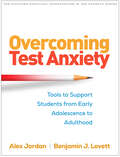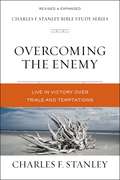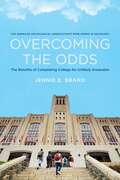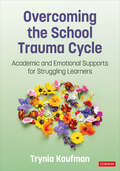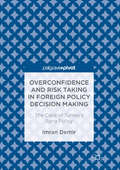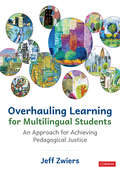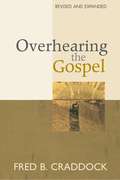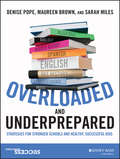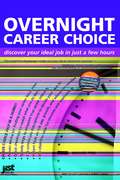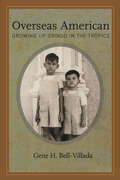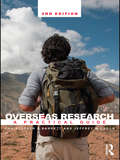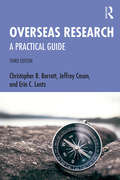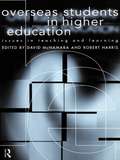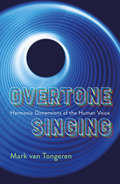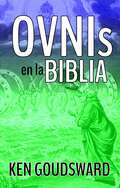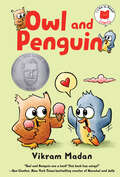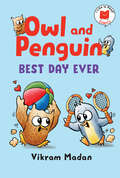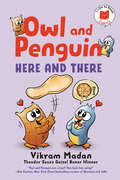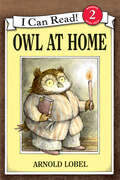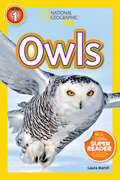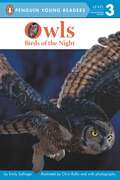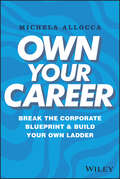- Table View
- List View
Overcoming Test Anxiety: Tools to Support Students from Early Adolescence to Adulthood (The Guilford Practical Intervention in the Schools Series)
by Benjamin J. Lovett Alex JordanThis state-of-the-art resource offers school and clinical professionals a comprehensive approach to addressing test anxiety in students from sixth grade through college and beyond (ages 11 to adulthood). The book uniquely combines acceptance-based behavior therapy interventions with practical strategies for improving study skills and enhancing test performance. By learning to disengage from unhealthy worries, students can decrease avoidance and unlock their academic potential. In a convenient large-size format, the book features sample dialogues and scripts, concrete test-taking guidance, and 27 reproducible handouts that can be downloaded and printed. This book is in The Guilford Practical Intervention in the Schools Series, edited by Sandra M. Chafouleas.
Overcoming the Enemy: Live in Victory Over Trials and Temptations (Charles F. Stanley Bible Study Series)
by Charles F. StanleyDefeat the devil every time he attacks.Many people today believe the devil does not exist. They think he is merely an ancient myth or a metaphor to explain the presence of evil in our world. However, the Bible clearly teaches that Satan is very real—and that he will stop at nothing to bring about our destruction. That&’s the bad news…But as Dr. Charles Stanley explains in Overcoming the Enemy, the good news is that Jesus Christ has already defeated the devil—utterly, permanently, and irrevocably. While this does not mean we will never be confronted with his evil, we have the promise that in Christ we will always have the victory over him.With over 1 million copies sold, the Charles F. Stanley Bible Study Series is a unique approach to Bible study, incorporating biblical truth, personal insights, emotional responses, and a call to action.Each study draws on Dr. Stanley&’s many years of teaching the guiding principles found in God&’s Word, showing how we can apply them in practical ways to every situation we face. This edition of the series has been completely revised and updated, and includes two brand-new lessons from Dr. Stanley.Each of the twelve lessons includes:Overview: A brief look at what is covered in the lessonLife&’s Questions: A teaching from Dr. Stanley that unpacks the topic of the lessonLiving the Principle: Application and Bible study questions based on the key pointsReflection: Key takeaways to put into practice today and tomorrow
Overcoming the Odds: The Benefits of Completing College for Unlikely Graduates (American Sociological Association's Rose Series)
by Jennie E. BrandEach year, millions of high school students consider whether to continue their schooling and attend and complete college. Despite evidence showing that a college degree yields far-reaching benefits, critics of higher education increasingly argue that college “does not pay off” and some students - namely, disadvantaged prospective college goers - would be better served by forgoing higher education. But debates about the value of college often fail to carefully consider what is required to speak knowledgeably about the benefits –what a person’s life might look like had they not completed college, or their college counterfactual. In Overcoming the Odds sociologist Jennie E. Brand reveals the benefits of completing college by comparing life outcomes of college graduates with their college counterfactuals. Drawing on two cohorts of nationally representative data from the Bureau of Labor Statistics National Longitudinal Surveys program, Brand uses matching and machine learning methods to estimate the effects of college completion across students with varying likelihoods of completing four-year degrees. To illustrate her findings, Brand describes outcomes using matched vignettes of college and non-college graduates. Brand shows that four-year college completion enables graduates to increase wages and household income, while also circumventing unemployment, low-wage work, job instability, poverty, and social assistance. Completing college also increases civic engagement. Most of these benefits are larger for disadvantaged than for more advantaged students, rendering arguments that college has limited benefits for unlikely graduates as flawed. Brand concludes that greater long-term earnings, and less job instability and unemployment, and thus more tax revenue, less reliance on public assistance, and high levels of volunteering indicate that public investment in higher education for students from disadvantaged backgrounds yields far-reaching collective benefits. She asserts that it is better for our society when more people complete college. Overcoming the Odds is an innovative and enlightening exploration of how college can transform lives.
Overcoming the School Trauma Cycle: Academic and Emotional Supports for Struggling Learners
by Trynia KaufmanDisrupt the painful cycle of academic challenges and emotional distress When students struggle with learning, it can be stressful for both them and their teachers. Struggling learners are more likely to experience low self-esteem, anxiety, depression, and behavioral issues—challenges that, combined with highly stressful learning experiences, can tip students into a trauma response that makes learning even harder. Overcoming the School Trauma Cycle explores the science behind how learning occurs in the brain, how it can be disrupted, and—most importantly—how to overcome the painful cycle of academic challenges and emotional distress. Inside, you′ll find: What the latest research tells us about how mental health issues can disrupt the learning process How academic and mental health challenges can fuel each other Manageable, whole-class practices and targeted supports to meet struggling learners’ academic and emotional needs Opportunities to self-assess and reflect Many schools have increased their focus on trauma-informed teaching and social-emotional learning, but these approaches are too often pitted against academic rigor when they are really two sides of the same coin. To improve outcomes for all students, we must address their social-emotional needs alongside their academic ones. In Overcoming the School Trauma Cycle, you′ll discover empowering practices to help all students learn and thrive.
Overcoming the School Trauma Cycle: Academic and Emotional Supports for Struggling Learners
by Trynia KaufmanDisrupt the painful cycle of academic challenges and emotional distress When students struggle with learning, it can be stressful for both them and their teachers. Struggling learners are more likely to experience low self-esteem, anxiety, depression, and behavioral issues—challenges that, combined with highly stressful learning experiences, can tip students into a trauma response that makes learning even harder. Overcoming the School Trauma Cycle explores the science behind how learning occurs in the brain, how it can be disrupted, and—most importantly—how to overcome the painful cycle of academic challenges and emotional distress. Inside, you′ll find: What the latest research tells us about how mental health issues can disrupt the learning process How academic and mental health challenges can fuel each other Manageable, whole-class practices and targeted supports to meet struggling learners’ academic and emotional needs Opportunities to self-assess and reflect Many schools have increased their focus on trauma-informed teaching and social-emotional learning, but these approaches are too often pitted against academic rigor when they are really two sides of the same coin. To improve outcomes for all students, we must address their social-emotional needs alongside their academic ones. In Overcoming the School Trauma Cycle, you′ll discover empowering practices to help all students learn and thrive.
Overconfidence and Risk Taking in Foreign Policy Decision Making
by Imran DemirThis book introduces a new perspective on risk seeking behaviour, developing a framework based on various cognitive theories, and applying it to the specific case-study of Turkey's foreign policy toward Syria. The author examines why policy makers commit themselves to polices that they do not have the capacity to deliver, and develops an alternative theoretical model to prospect theory in explaining risk taking behaviour based on the concept of overconfidence. The volume suggests that overconfident individuals exhibit risk seeking behaviour that contradicts the risk averse behaviour of individuals in the domain of gain, as predicted by prospect theory. Using a set of testable hypothesis deduced from the model, it presents an empirical investigation of the causes behind Turkish decision makers' unprecedented level of risk taking toward the uprising in Syria and the consequences of this policy.
Overhauling Learning for Multilingual Students: An Approach for Achieving Pedagogical Justice
by Jeff ZwiersAdopt a strengths-based, justice-centered approach to teaching multilinguals Offering educators a path to pedagogical justice for multilingual learners, Overhauling Learning for Multilingual Students outlines a comprehensive alternative model for instruction and assessment. With an emphasis on engaging multilingual learners in authentic communication and promoting student agency and creativity, this book is an urgent call-to-action for educators at all levels to value and leverage the many assets that multilingual students bring to every classroom. The book outlines six dimensions of pedagogical justice and offers practical strategies to implement a learner-centered approach that will help all students thrive. Additional features include: An assets-based framework designed to help multilingual learners learn and grow Guidance for shifting instructional strategies away from remediation and test preparation toward an engaging, justice-centered approach Activities to to help students collaboratively build up unique and important ideas (claims and concepts) across disciplines Written by scholar, practitioner, and best-selling author, Jeff Zwiers, Overhauling Learning for Multilingual Students supports educators to de-think and rethink traditional one-size-fits-all approaches to teaching and assessing multilingual learners.
Overhauling Learning for Multilingual Students: An Approach for Achieving Pedagogical Justice
by Jeff ZwiersAdopt a strengths-based, justice-centered approach to teaching multilinguals Offering educators a path to pedagogical justice for multilingual learners, Overhauling Learning for Multilingual Students outlines a comprehensive alternative model for instruction and assessment. With an emphasis on engaging multilingual learners in authentic communication and promoting student agency and creativity, this book is an urgent call-to-action for educators at all levels to value and leverage the many assets that multilingual students bring to every classroom. The book outlines six dimensions of pedagogical justice and offers practical strategies to implement a learner-centered approach that will help all students thrive. Additional features include: An assets-based framework designed to help multilingual learners learn and grow Guidance for shifting instructional strategies away from remediation and test preparation toward an engaging, justice-centered approach Activities to to help students collaboratively build up unique and important ideas (claims and concepts) across disciplines Written by scholar, practitioner, and best-selling author, Jeff Zwiers, Overhauling Learning for Multilingual Students supports educators to de-think and rethink traditional one-size-fits-all approaches to teaching and assessing multilingual learners.
Overhearing the Gospel
by Fred B. CraddockWhen originally published in 1978, Overhearing the Gospel introduced "narrative preaching" and forever changed the shape of contemporary preaching. Now a new generation of preachers can learn from the master himself in this revised and expanded edition of Craddock's groundbreaking method.
Overloaded and Underprepared: Strategies for Stronger Schools and Healthy, Successful Kids
by Denise Pope Sarah Miles Maureen BrownReduce stress and improve academic success with this research-backed framework for change Many American students are overworked, stressed-out, and still underperforming relative to their global peers. Overloaded and Underprepared: Strategies for Stronger Schools and Healthy, Successful Kids gives you the tools you need to begin making immediate changes at your school, in the community, and at home to benefit all kids. It provides a concrete framework to reduce student stress while engaging kids in real learning. The book helps you identify areas for improvement at your school, brainstorm possible solutions, identify potential obstacles, and achieve buy-in from multiple stakeholders, and it outlines the research-based SPACE framework, providing best practices on: Students' schedule and use of time Project- and problem-based learning Alternative and authentic assessments Climate of care Education of parents, students, and faculty about well-being Our current fast-paced, high-pressure culture works against everything we know about healthy child development. We all want our kids to do well in school and to master certain skills, but our largely singular focus on academic achievement has resulted in a lack of attention to other components of a successful life--the ability to be independent, ethical, and engaged critical thinkers. Using real-life case studies from schools throughout the country, this book is a guide for change, offering a practical action plan that can be implemented in a single classroom or on a school-wide scale.Overloaded and Underprepared helps educators better prepare students--mentally, emotionally, and academically--to handle the challenges of college and careers.
Overnight Career Choice: Discover Your Ideal Job in Just a Few Hours
by Michael FarrEager to find a career you'll love? Don't fret and sweat. Overnight Career Choice comes to the rescue. Discover your best career fit quickly and enjoy career success and satisfaction for years to come. Mike Farr covers the nine essential factors for defining your ideal career quickly so you won't spend months or years on the wrong career path.
Overseas American: Growing Up Gringo in the Tropics (Willie Morris Books in Memoir and Biography)
by Gene H. Bell-VilladaBorn in 1941 of a Hawaiian mother and a white father, Gene H. Bell-Villada, grew up an overseas American citizen. An outsider wherever he landed, he never had a ready answer to the innocuous question “Where are you from?” By the time Bell-Villada was a teenager, he had lived in Puerto Rico, Venezuela, and Cuba. Though English was his first language, his claim on US citizenship was a hollow one. All he knew of his purported “homeland” was gleaned from imported comic books and movies. He spoke Spanish fluently, but he never fully fit into the culture of the Latin American countries where he grew up. In childhood, he attended an American Catholic school for Puerto Ricans in San Juan, longing all the while to convert from Episcopalianism so that he could better fit in. Later at a Cuban military school during the height of the Batista dictatorship, he witnessed fervent political debates among the cadets about Fidel Castro's nascent revolution and US foreign policy. His times at the American School in Caracas, Venezuela, are tinged with reminiscences of oil booms and fights between US and Venezuelan teen gangs. When Bell-Villada finally came to the United States to stay, he found himself just as rootless as before, moving from New Mexico to Arizona to California to Massachusetts in quick succession. His accounts of life on the campuses of Berkeley and Harvard during the tumultuous 1960s reveal much about the country's climate during the Cold War era. Eventually the “Gringo” came home, finding the stability in his marriage and career that allowed him to work through and proudly claim his identity as a “global nomad.”
Overseas Research II: A Practical Guide
by Christopher B. Barrett Jeffrey CasonResearchers in developing countries often find that the particular country in which they work presents a range of unforeseen challenges. Indeed, their ability to carry out effective scholarship is often highly dependent on these factors. The great differences between working in countries as varied as India, China, Bolivia and Kenya can often come as a shock to the system. An ability to negotiate a bewildering array of cultural and logistical obstacles is therefore essential. Overseas Research II: A Practical Guide distils essential lessons learned by scores of students and scholars who have collected data and done fieldwork abroad. The authors fill the reader in on the many crucial pieces of advice: how to prepare for the field, how and where to find funding for one’s fieldwork, issues of personal safety and security, and myriad logistical and relational issues that often define one’s research experience abroad. As Christopher B. Barrett and Jeffrey Cason suggest, "Fieldwork is a sequence of decisions, some about the conduct of research, some about the conduct of life." The book focuses new field researchers’ attention on that productive intersection, and includes many real-life accounts from experienced professionals whose own work abroad can inform those facing the field for the first time.
Overseas Research: A Practical Guide
by Christopher B. Barrett Jeffrey Cason Erin C. LentzWhen conducting research in developing countries, an ability to negotiate a bewildering array of cultural and logistical obstacles is essential. Overseas Research: A Practical Guide distills essential lessons from scores of students and scholars who have collected data and done fieldwork abroad, including how to prepare for the field, how and where to find funding for one’s fieldwork, issues of personal safety and security, and myriad logistical and relational issues. By encouraging researchers to think through the challenges of research before they begin it, Overseas Research will help prepare fieldworkers for the practical, logistical, and psychological considerations of very demanding work, help save valuable time, make the most of scarce financial resources, and enhance the quality of the field research. This third edition contains new material on social media, including representation of research subjects/collaborators, students’ digital branding and image, and representing universities abroad when posting publicly. It also covers emerging technologies such as solar panels for power in remote locations, new ways of digitally sending and receiving money, and incorporates more perspectives of women, LGBTQ+ people, and people of color researching abroad. The book will be of interest to overseas fieldworkers, and also to undergraduates in subjects such as anthropology, economics, geography, history, international studies, politics, sociology, and development studies.
Overseas Students in Higher Education: Issues in Teaching and Learning
by Robert Harris David McNamaraHigher education institutions are increasingly concerned with the quality of their teaching and learning experiences they provide for students, including the increasing number from overseas. In this text, some of the leading authorities in the field bring together current research and sound practical advice on the provision of quality teaching and learning for overseas students. The text represents a wide range of overseas students' experiences from the Pacific Rim, China and the European Community.
Overtone Singing: Harmonic Dimensions of the Human Voice
by Mark Van TongerenAn indispensable guide to a deeper understanding of the nature of the human voice and its harmonic possibilities from East to West.Overtone Singing is the most comprehensive book ever written on the hidden harmonies of the human voice. Ethnomusicologist and vocalist Mark van Tongeren offers fascinating insights into the timeless and universal aspects of sound and vibration. Grounded in the author&’s decade-long study of Asian music, the book draws upon field work, interviews with Eastern and Western musicians, and copious scholarship to present a multidisciplinary vision of sound that runs from global music to the science of acoustics and perception, onward to the philosophical and spiritual dimensions of music. Written in a nontechnical style, this generously illustrated book is an indispensable guide for musicians, listeners, and performers seeking a deeper understanding of the nature of the human voice and its harmonic possibilities from East to West.
Ovid: Amores, Metamorphoses Selection
by Ovid Laurie Haight Keenan Charbra Adams Jestin Phyllis B. Katz Bridget Dean Laurel DraperNIMAC-sourced textbook
Ovnis en la Biblia
by Ken GoudswardEn 1968, Erich Von Daniken abrió una puerta por la que millones de curiosos han mirado con asombro y posiblemente algo de desconcierto. Ahora, de pie sobre los hombros de ese gigante, Ken Goudsward abre la puerta de par en par en este asombroso nuevo examen de las Escrituras, utilizando una exégesis hebrea sin precedentes para revelar no menos de 30 encuentros extraterrestres dentro de las páginas del libro más vendido. de todos los tiempos. En un momento de encrucijada entre la divulgación y la conspiración, la Biblia nunca ha sido más relevante.
Owl and Penguin (I Like to Read Comics)
by Vikram MadanTwo feathered friends are Frog and Toad for the emoji generation in this delightful graphic novel for emerging readers. <p><p>Owl likes peace and quiet. Penguin likes to SING OUT LOUD. But best friends don’t need to be the same. Sometimes it’s good to disagree! <p><p>Owl and Penguin celebrate their differences and solve their problems with creative play. From ice cream mishaps to rainy day chills, there’s nothing these pals can’t get through together. <p><p>In three nearly wordless stories, expressive art takes charge of the storytelling, supplemented by simple text captions and emoticon-style images in speech bubbles. This innovative format supports visual literacy and sight word recognition for the earliest independent readers. With warm humor and a joyful palette, it’s perfect for kids to giggle over on their own. <p><p>I Like to Read® Comics are perfect for kids who are challenged by or unengaged in reading, kids who love art, and the growing number of young comics fans. Filled with eye-catching art, humor, and terrific stories, these comics provide unique reading experiences for growing minds. Like their award-winning I Like to Read® counterparts, these books are created by celebrated artists and support reading comprehension to transform children into lifelong readers. A Junior Library Guild Gold Standard Selection. <P><P><i>Advisory: Bookshare has learned that this book offers only partial accessibility. We have kept it in the collection because it is useful for some of our members. Benetech is actively working on projects to improve accessibility issues such as these.</i>
Owl and Penguin: Best Day Ever (I Like to Read Comics)
by Vikram MadanTwo feathered friends are Frog and Toad for the emoji generation in this delightful graphic novel series for emerging readers.Owl wants to play catch. But Penguin wants to play tennis! Which should they play? Sometimes best friends disagree. Though Owl and Penguin are opposites, they like to solve their conflicts with creative play. From conquering fears to flying a runaway kite, there&’s nothing these pals can&’t get through together.In five nearly wordless stories, expressive art leads the storytelling, supplemented by simple text captions and emoticon-style images in speech bubbles. This innovative format supports visual literacy and sight word recognition for the earliest independent readers. With warm humor and a joyful palette, it&’s perfect for kids to giggle over on their own.I Like to Read® Comics are perfect for kids who are challenged by or unengaged in reading, kids who love art, and the growing number of young comics fans. Filled with eye-catching art, humor, and terrific stories, these comics provide unique reading experiences for growing minds. Like their award-winning I Like to Read® counterparts, these books are created by celebrated artists and support reading comprehension to transform children into lifelong readers.A Junior Library Guild Gold Standard Selection
Owl and Penguin: Here and There (I Like to Read Comics)
by Vikram MadanTwo feathered friends are Frog and Toad for the emoji generation in this delightful graphic novel series for emerging readers by a Theodor Seuss Geisel Honor winner.Owl and Penguin want to make a pizza. But they can&’t agree on how to toss the dough. Owl can do it better . . . no, Penguin can do it best! Hmmm, maybe they should just get takeout.Sometimes friends disagree. Though Owl and Penguin are opposites, they like to solve their conflicts with creative play. From making snow creatures to hiking a mountain, there&’s nothing these pals can&’t get through together. In three nearly wordless stories, expressive art leads the storytelling, supplemented by simple text captions and emoticon-style images in speech bubbles. This innovative format supports visual literacy and sight word recognition for the earliest independent readers. With warm humor and a joyful palette, it&’s perfect for kids to giggle over on their own.I Like to Read® Comics are perfect for kids who are challenged by or unengaged in reading, kids who love art, and the growing number of young comics fans. Filled with eye-catching art, humor, and terrific stories, these comics provide unique reading experiences for growing minds. Like their award-winning I Like to Read® counterparts, these books are created by celebrated artists and support reading comprehension to transform children into lifelong readers.A Junior Library Guild Gold Standard Selection
Owl at Home (I Can Read Level 2)
by Arnold LobelWelcome to Owl's Cozy home in this classic Arnold Lobel I Can Read! Owl lives by himself in a warm little house. But whether Owl is inviting Winter in on a snowy night or welcoming a new friend he meets while on a stroll, Owl always has room for visitors!Arnold Lobel's beloved Level 2 I Can Read classic was created for kids who read on their own but still need a little help. Whether shared at home or in a classroom, the engaging stories, longer sentences, and language play of Level Two books are proven to help kids take their next steps toward reading success.The classic Frog and Toad stories by Arnold Lobel have won numerous awards and honors, including a Newbery Honor, a Caldecott Honor, ALA Notable Children’s Book, Fanfare Honor List (Horn Book), School Library Journal Best Children’s Book, and Library of Congress Children’s Book.
Owls (Readers)
by Laura MarshIn this level 1 reader, young readers will explore the feathery world of adorable owls. Follow these curious-looking creatures through their wooded habitats, and learn how owls raise their young, hunt, and protect themselves. Beautiful photos and carefully leveled text make this book perfect for reading aloud or for independent reading.
Owls: Birds of the Night (Penguin Young Readers, Level 3)
by Emily SollingerDid you know that the biggest owl has a wingspan of five feet? That's big! The smallest owl is no bigger than an avocado. Filled with photographs and vivid illustrations, this book will teach you all about these beautiful birds.Excerpt:When the owlets are about one month old, they are ready to leave the nest.At first, owlets hop from branch to branch.They grab onto tree bark.They wander around on the ground.They practice flapping their wings.Look!They are flying!The owlets are now called fledglings(say: FLEJ-lings).
Own Your Career: Break the Corporate Blueprint and Build Your Own Ladder
by Michela AlloccaImbue your career with purpose and meaning In Own Your Career: Break the Corporate Blueprint and Build Your Own Ladder, popular financial analyst and entrepreneur Michela Allocca delivers an exciting new discussion of how to break the corporate blueprint and forge your own path to a fulfilling and rewarding career. You'll learn to find happiness and purpose at work, whether you're interested in climbing the corporate ladder or embarking on a different path. The book offers a collection of tactical strategies you can apply immediately within your career to start getting more out of your day job and redefine what success means to you. You'll find: Effective tactics for positioning yourself in your resume, articulating your skills in interviews, and negotiating your compensation to ensure you are not only landing the job, but that it's as lucrative as possible. Practical strategies to navigate career changes and make intentional career decisions with confidence. Systems to maximize your earning potential and build a successful side hustle you can take to the next level A can't-miss guide for young professionals, the newly graduated, and aspiring entrepreneurs, Own Your Career offers realistic advice to excel at work and take your professional power back, both inside and outside of the office.
